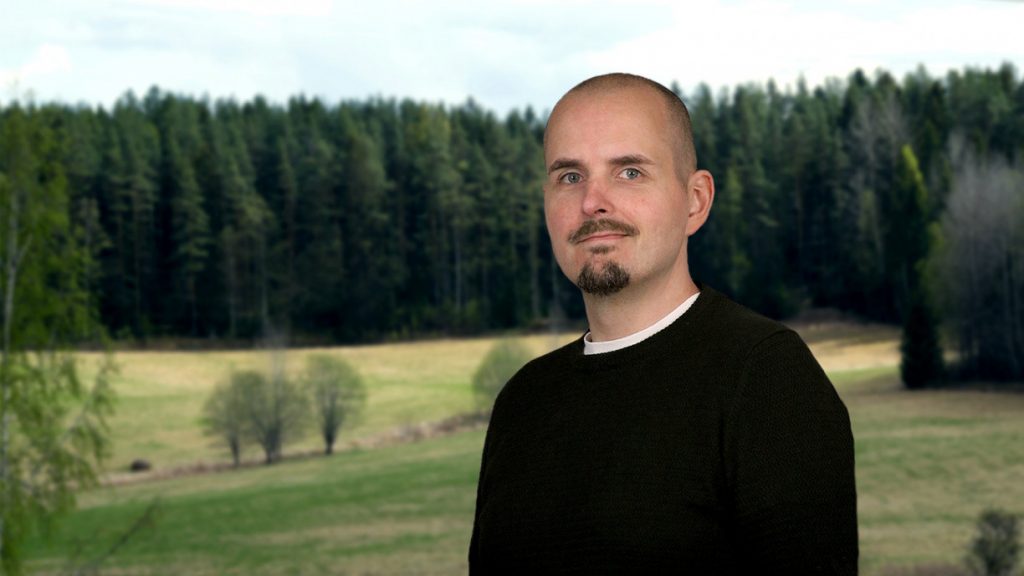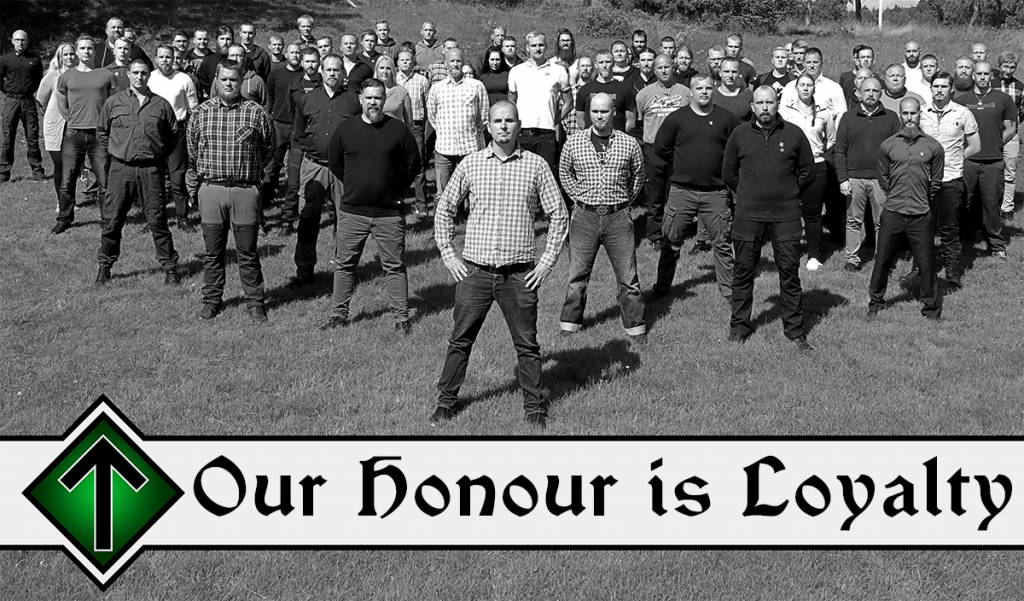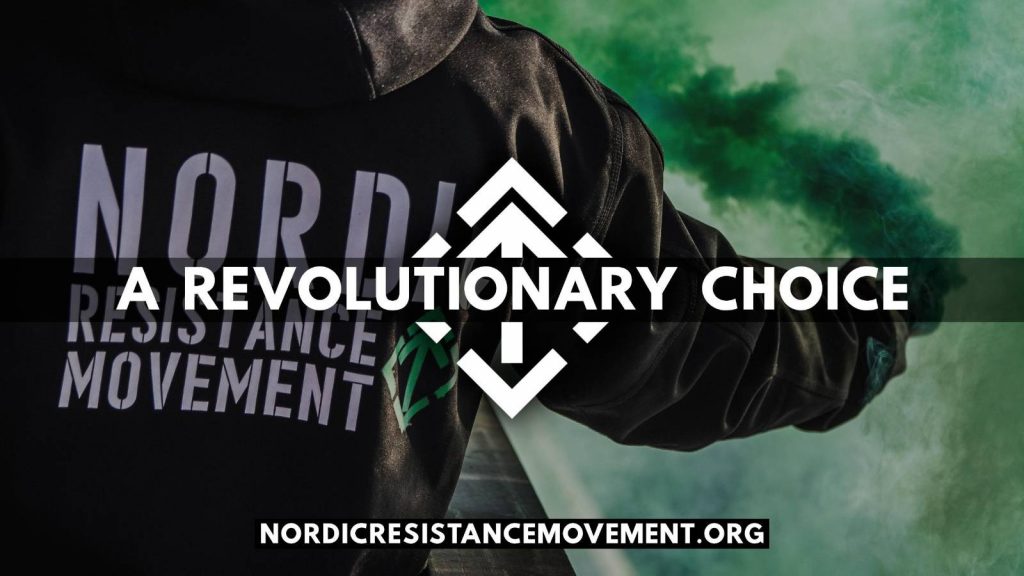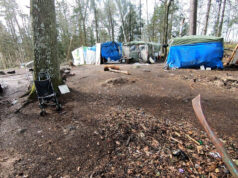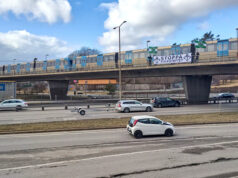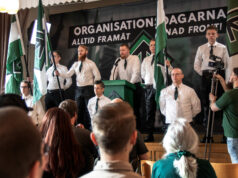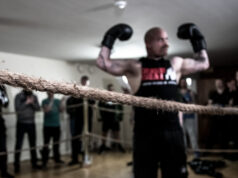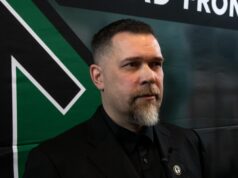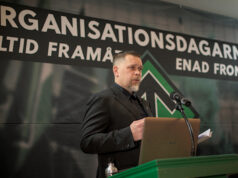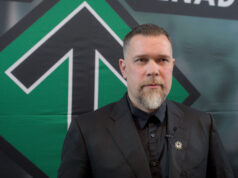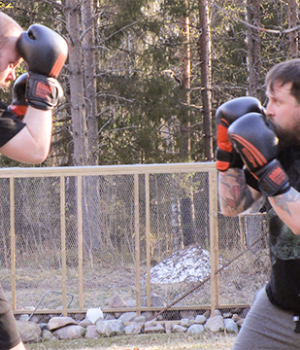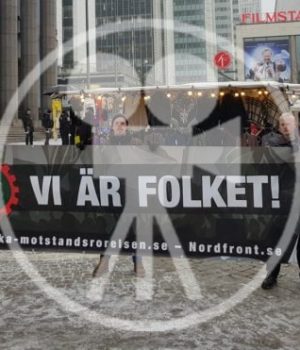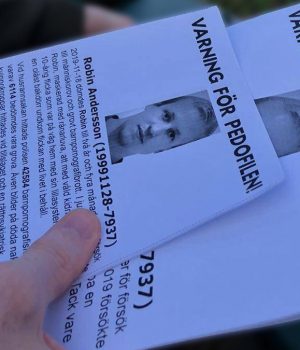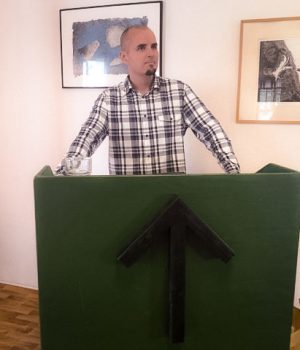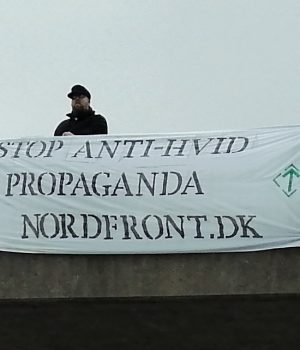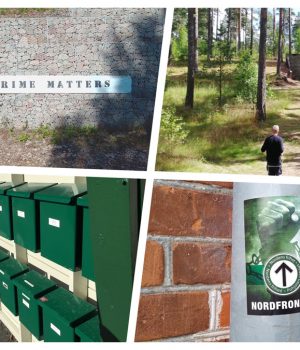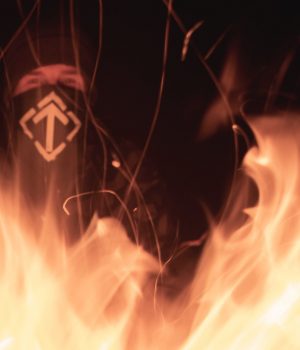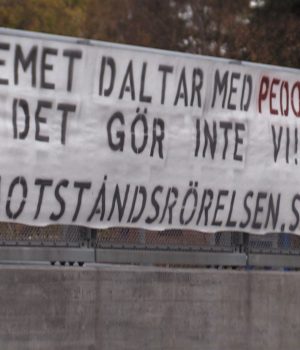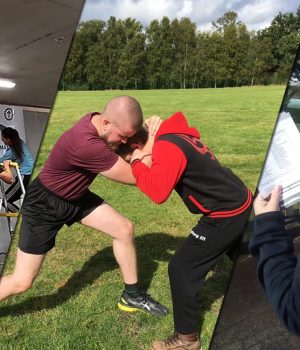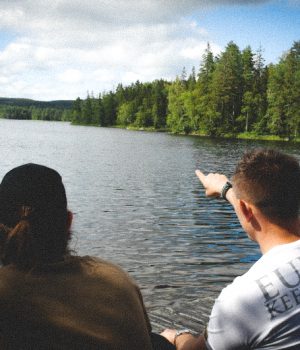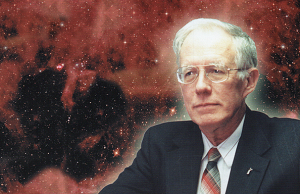INTERVIEW. Simon Lindberg sits down for an exclusive interview about the organisation and himself, ahead of the parliamentary election in autumn.
Simon Lindberg, could you begin by giving a short presentation of yourself?
I am a father of four living in Grängesberg, in Ludvika Municipality, central Sweden. I have been involved in the national struggle my whole adult life and for most of my teens. Since 2015, I have been the leader of the Nordic Resistance Movement.
The Nordic Resistance Movement is standing in the parliamentary election for the Riksdag and four municipal council elections this year. Which election are you standing in?
I am only standing in the parliamentary election, not in a municipality. I am the lead candidate for the Nordic Resistance Movement.
What are the Resistance Movement’s key issues in the election?
Our most important issues in the autumn elections are the ever-present and increasingly more alarming matters of immigration and repatriation; the almost equally serious issue of the environment and nature; and, in relation to Covid-19 and the Ukraine war, the extremely topical issue of independence.
The immigration of racial foreigners must stop, and comprehensive repatriation must begin as soon as possible. If this is not done, no other political issue will matter, as our people will be biologically eradicated via the ongoing population replacement.
Regarding the environment and nature, the current debate is extremely one-sided and skewed in favour of big finance, as it is 100% focused on global warming, with the “solution” often being that private individuals must consume even more (electric cars etc.). Instead, we choose to focus on far more important issues for our environment, such as pollution, exploitation and the ongoing destruction of the earth’s biological diversity.
When it comes to independence, we can clearly see that Sweden and the Nordic countries are completely dependent on imports from other peoples and countries, even though we could actually produce almost everything we need ourselves. We are going to make ourselves even more dependent if we join the Nato war alliance. The Nordic Resistance Movement instead wants to create a nation with a level of self-sufficiency over 100% that is free from all anti-Nordic alliances.
Can you rank these key issues according to importance for the Resistance Movement? Maybe the order you just listed them in gives a hint?
Immigration and repatriation are and will be (as long as the problems remain unsolved) the absolute most important issues, as they are the most acute and, like I said, no other issue in the world matters if our race no longer exists.
Regarding the others, the environment and nature are the next most important, to the extent that independence will be irrelevant if nature and the planet cease to exist, but the question of independence is more topical. A Nato membership, for example, could still be prevented via massive popular protests; but stopping environmental pollution and healing the planet is a far more extensive process.
Are you a politician?
I am politically interested, but I certainly do not see myself as a politician, no. Rather an activist, or maybe even a fighter. I am not involved in the national struggle because it benefits me; on the contrary, it has brought about many personal sacrifices over the years, and I am probably as far from being a populist as you can get. Instead I stand up for what is right and proper and say what needs to be said – regardless of whether the masses like it or not, or what it costs me.
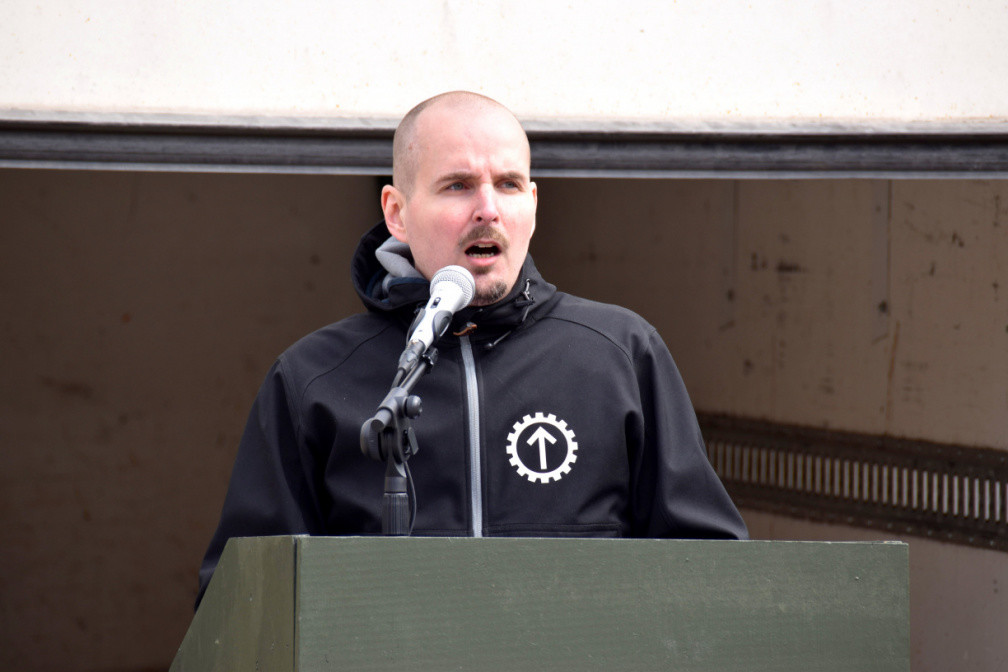
Will a senator in the liberated Nordic Nation call himself a “politician”? Has the word been sullied beyond repair by those who abuse their power, or do you believe it can be reclaimed?
Obviously I believe the meaning of words can change over time. There is a constant struggle over vocabulary in society; for example, we can see how the meanings of words like “democracy” and “racist” have been altered drastically in just a few decades. Of course, the meanings of such words can be changed again. For the same reason, we persist with words like “propaganda”, “radical”, “National Socialist”, “revolutionary” and so on, because we do not accept losing these words to the establishment. “Politician” is not a word we have felt compelled to fight for, but maybe it will be in the future, who knows?
What makes a good leader?
Of course a leader has to delegate duties and motivate his subordinates; but to give a little more unique and interesting answer, I think an important characteristic for a good leader is that he should never sit on a high horse or think himself too good to do something that needs doing.
A leader who is never on the streets himself cannot demand that his subordinates should be. A leader who thinks himself above putting up stickers or spraying logos cannot expect someone else to do it. A leader who cannot sweep the floor after giving a lecture or help out in the kitchen can never expect others to want to assume such duties. Of course it would be a big waste of resources if the leader were to do all this at the cost of the really important things required of a leadership position, but my point is that when circumstances demand it, a good leader must also be able to do what everyone else does.
A good leader leads his men from the front and sleeps on a bedroll by their side in the barracks, but refrains from both these things if there is a greater need for leadership elsewhere.
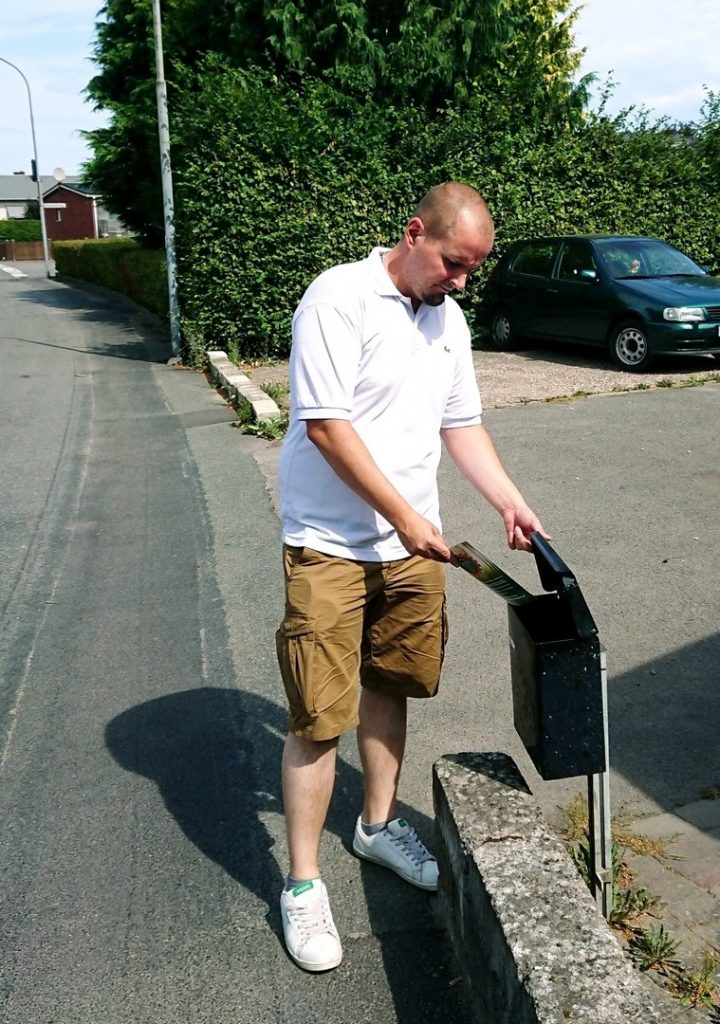
The Nordic Resistance Movement has leaders at several different levels. How are leaders appointed in the movement? How do we ensure we appoint the right people?
They are appointed 100% based on a combination of competence and demonstrated loyalty. Competence is an obvious factor, but the importance of loyalty in an oppositional organisation cannot be emphasised enough. No matter how competent you are in your field, that competence is pretty much worthless if you cannot remain resolute when things are going to hell around you. Appointing untested chiefs based solely on competence can be extremely counter-productive. At the same time, we naturally do not want to give people positions of responsibility based purely on loyalty, like some kind of nepotism – no, the motto of “the right man in the right place” must always be our guiding principle.
Actually, you can only be absolutely sure you have appointed the right people with the passage of time. Sometimes you may think you have made the right choice, or that there is no right choice, or that you have made the best choice based on the circumstances, which later proves to be completely wrong.
On a more practical level, every chief is responsible for appointing people to the chief positions beneath them, but with dialogue about the process from both subordinates and superiors.
Have you completely changed your position on a political issue? If so, what was it?
I don’t know if I have completely changed my mind on any important political issue, but there are some issues I have come to adopt a more nuanced view on; realised the importance of; or, on the other hand, have concluded are not that important after all.
One such issue is the fact that I was probably more conspiracy-minded in the past. I had a greater belief in secret societies that made detailed decisions on matters and actively tried to eradicate us. I’m not saying that such malicious organisations don’t exist today, but I have understood that it’s much more about economic interests and nepotism than conscious and planned evil (other than the amount of evil economic interests and nepotism can entail for those who stand in their way).
The issue of the Nordic Nation has also become considerably more important over the years. As a young man, I was more of a nationalist and a “Sweden friend”. Today I understand that Sweden and the Swedes are completely lost if we do not unite in a larger community with our kinsfolk so we can truly stand independently against the superpowers in both the East and West.
Has there been a special occasion during your “political career” when you felt particular enthusiasm about what has been achieved in the struggle and for the future?
Absolutely, something extraordinary happens continually every month that increases motivation for the struggle. Individual examples of immense self-sacrifice among our members and activists, or success stories from the streets or somewhere else where our popularity was affirmed among people who did not even know about us before.
To cite some larger and more concrete examples, I was extremely pleased when we became the first national organisation in modern times to hold major demonstrations in more than one city simultaneously, just as I was the first time I was named as one of the world’s most dangerous individuals. Furthermore, taking over central Copenhagen and Reykjavik was very enjoyable. All of these were unparalleled energy boosters!
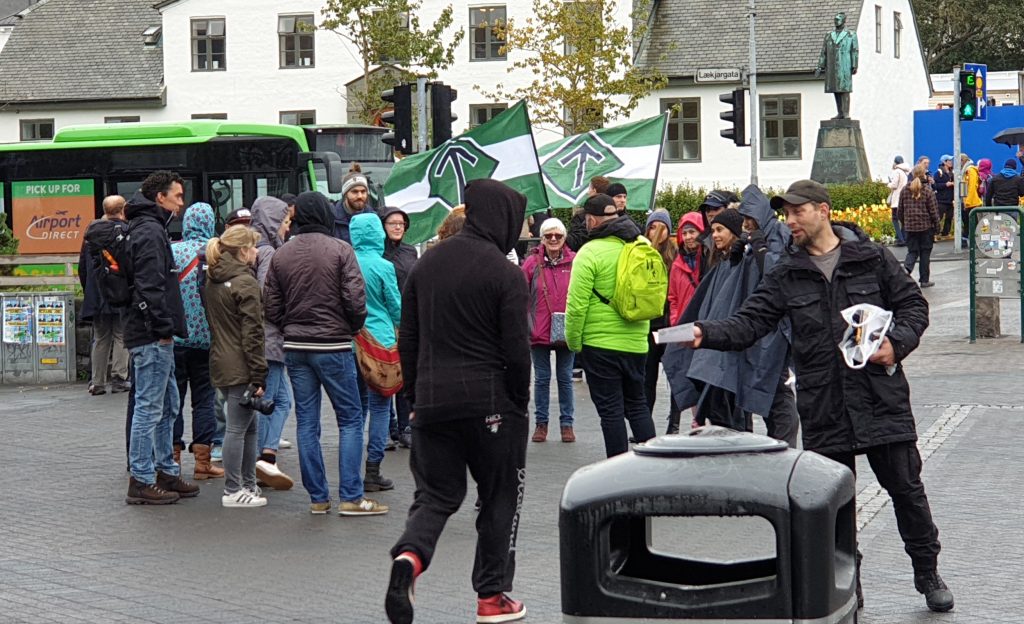
Every month something extraordinary happens that increases motivation for the struggle.
Has there been any particular occasion during your “political career” when you felt disillusionment or perhaps experienced waning enthusiasm for the future?
It’s extremely sad every time someone falls victim to the temptations of laziness and leaves the struggle; and particularly sad when these defectors show themselves to be completely different and inferior people to what they pretended to be, in addition to betraying the organisation and their former comrades.
There have been a few stabs in the back over the years, but I would say firstly that such occasions aren’t very strange, considering how hard the system attempts to fight us; and secondly, that the resulting disappointment is always just temporary. In the long run, we are strengthened and become better people on account of these momentary setbacks.
Is there any general advice to give the disheartened nationalist who is disappointed with what the struggle has to offer at the moment, but who promises to return when things “really start to heat up”?
It’s about trying to focus on the positive aspects instead of the negative and not making the perfect the enemy of the good. There will almost certainly never be a situation or organisation that you view as exemplary from your individual outlook, but organising is precisely about being able to depart from this egocentric outlook and joining forces with others for a higher cause. This can require emphasising the good instead of the potentially negative and looking for the best existing alternative, instead of looking for the unattainably perfect one. There is loads of optimism and a lot of white pills to experience on a continual basis in our struggle, if you just choose to see them.
Then, as I mentioned earlier, there is the importance of loyalty. Naturally, you cannot appear out of nowhere in a difficult situation and expect to have people’s trust. It is during the current phase of the struggle that we have the possibility of testing our abilities, and in which people can show what they are made of during the fire drills, so there will be no question of our readiness when things really are on fire.
There is loads of optimism and a lot of white pills to experience on a continual basis in our struggle, if you just choose to see them.
You mentioned you are a father. How does it work for you combining family life, professional life and your political involvement?
Virtually all people – whomever you ask and whatever situation they are in – talk about putting together the puzzle of life. It’s probably the same case for someone in my situation, maybe with a few more puzzle pieces. Everything you do or don’t do in life is about priorities, and I think an important part of the solution lies in creating good routines for yourself.
Have you stood in elections for any other organisation besides the Nordic Resistance Movement?
Yes, in 2006 I was on the list of national parliamentary candidates and stood for election to Kristianstad municipal council for the now defunct National Socialist Front party (NSF).
How would you briefly describe the difference between the NSF and the Nordic Resistance Movement, and between your own roles in each organisation?
I fought wholeheartedly for the NSF during the ten years I was a member, and I really liked the party, so it’s not my intention to offend anyone, but in retrospect I can say that the NSF was not as mature, not as profound, as the Resistance Movement is. I usually say the NSF was more National Socialist on paper, while the Resistance Movement is National Socialist in body, heart and soul. The NSF was more political, and the Resistance Movement more ideological.
My own role is quite different. In the NSF, I was a regional leader and had responsibility for the activism in Scania. Now in the Resistance Movement, I am the highest leader for the whole Nordic organisation, with all its subsidiary branches and fields of activity. It’s a bit like being a branch manager for a local company that’s part of a larger chain, and being the CEO of the whole corporate group.
It states in the party programme Our Path that the Nordic Resistance Movement is a “revolutionary struggle organisation”. Why should such a group stand for a parliamentary election arranged within a liberal democracy?
We conduct propaganda work intensively all year round – election year or not, but participation in elections is above all a very clear and concrete venture at a time when regular people are significantly more receptive to politics than normal. It also gives us legitimacy among certain groups of people who otherwise find it difficult to understand what we mean when we say we are fighting to take power in the Nordics.
We have no illusions of winning any parliamentary elections as long as the system is rigged in the way it is today, but we believe election campaigns give us an excellent platform to get our message out, and also give us an opportunity to strengthen, particularly at local level, where we’re also standing in municipal elections.
If we manage to secure a mandate somewhere despite abnormal opposition from the system – with everything from media lies to closed bank accounts and other forms of more direct election fraud – it would of course be great and would give us another platform from which to convey our message; but whatever happens, our election campaign will make our organisation stronger.
At what point in the history of the organisation was the decision made to establish a parliamentary branch of the Resistance Movement?
I am a little unsure as to when the decision was actually made, as I was not a part of the National Leadership at that point myself, but the decision was announced in 2014, and a party was formally established in 2015, when the collection of signatures was completed.
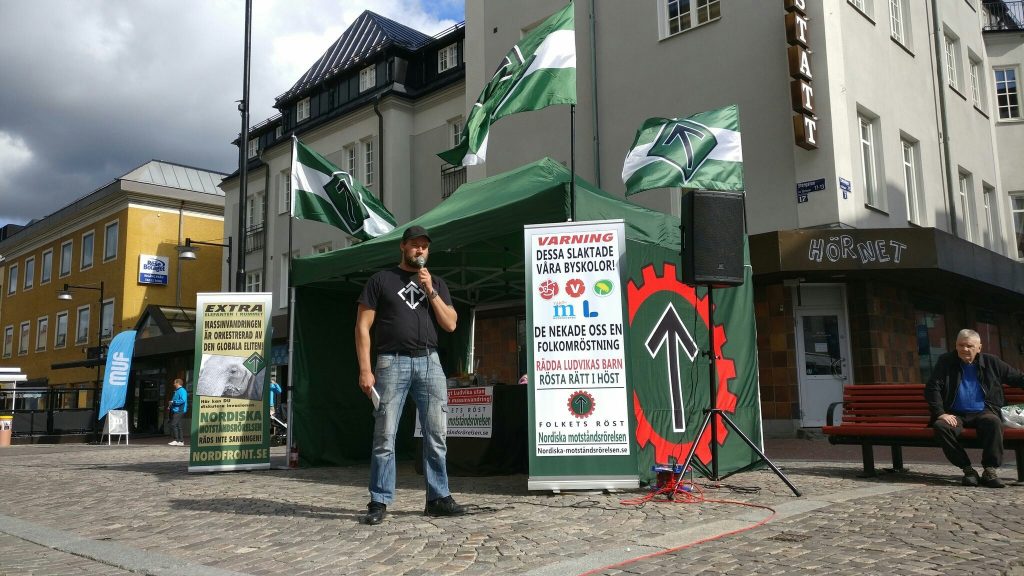
Four years on
The Resistance Movement stood in the parliamentary election and in three municipal council elections in 2018. What lessons do you think can be learned from that experience?
Oh, there are loads of things we have learned from the election that we communicated internally and are now putting into practice in this year’s election campaign, but I don’t really know if there is anything I want to talk about publicly right now. More focus locally and less nationally is one such thing I can say, and more quality than quantity when it comes to propaganda would be another.
How do you think society has changed over these four years?
The most obvious thing of all is that multiculturalism has expanded even more. Many towns that still had hope in 2018 are virtually lost today. Many small localities that were ethnically homogenous then have a growing proportion of racial aliens today.
It has also become increasingly clear from the Covid-19 restrictions, upcoming terrorism laws, Nato membership application and attempts to ban the Resistance Movement that today’s so-called democracy is totalitarian to its core, but that it still attempts to maintain the illusion of some kind of freedom for the people.
Along with both of these negative aspects, some sections of the public have at least become more receptive towards radical political alternatives and the knowledge that change is necessary, which is of course very positive for our opportunities to reach out to people.
One obvious change is the degree of censorship on various platforms. During the previous election campaign, videos of the Resistance Movement’s public activities were available on YouTube, while Nordisk Radio’s podcasts were on Spreaker. Now they aren’t. Do you think this development will escalate or change direction in the future? Is there a point when building your own platforms starts to trump repeated platform-switching?
Unfortunately, I believe we must be fully prepared for the day when we will not be allowed to be on the internet at all – when we won’t even have the possibility of having a domain on the web. This is one of the many reasons why it is so incredibly important that we always gravitate towards street activism as the core of our activities, and not the other way around. When we are removed from the internet – or for that matter, when the internet is completely shut down due to terrorism or warfare – then we will not be starting from scratch, but will have internalised routines and a high level of competence.
Our own platforms are something we have started to work on more and more. The problem is that they do not reach nearly as many people. YouTube, Facebook, Google and others have huge monopolies on their respective markets.
How do you think the Resistance Movement and the conditions for our struggle have developed in the period since the last election? The lying press, security police and intelligence services claim we have been “weakened by defections and divisions”. At the same time, powerful forces regard us as such a great threat to the current system that they want to ban us at any cost. What is actually true here?
The truth is that we have been both strengthened and weakened at the same time. We had more members in 2018 than we have today, and we conducted more quantitative, external activism. However, at the same time, the organisation’s leadership and inner core have become decidedly stronger, and we have conducted more internal activism, such as martial arts training, social activities and study circles, than we did then.
That being said, we are undoubtedly a greater threat to the system today than we were in 2018. Members come and go in waves, depending on various circumstances. That is the way it has always been and generally always will be, whatever we do about it. Therefore, it is far more important that the leadership be strong and the core stable so we have the best possible conditions the next time we get a large influx of members.
When shit really hits the fan, we will be in much greater need of a good structure and loyal, close-knit comrades than being able to entice X number of people to voting booths or even to a demonstration. By that I do not mean that those things are not of interest to us, just that the former is even more important.
We are undoubtedly a greater threat to the system today than we were in 2018.
Philosophy and the future
The Resistance Movement advocates for referenda and wants to introduce representative government, while we also emphasise the importance of strong leadership. How do these principles fit together?
They fit together very well, actually, and are quite similar to how things were in the original democracy in Ancient Greece.
Firstly, we believe that the people themselves can make the best decisions when it comes to everyday matters that affect them locally in their regular lives – far better than anyone else can. On the other hand, we know that on really important issues that concern the nation’s survival, freedom and development, things would function much better with a clear, authoritarian leadership that can make the necessary decisions without needless bureaucracy and parliamentary bickering.
Secondly, we believe in the responsibility principle, with a leader who is highly visible and takes responsibility for his decisions, and that a healthy and enlightened people in a society with a diverse media must also have the possibility of removing their leaders if they prove to be insufficiently competent. We want to give this power to the people via both votes of no confidence and the right to retain their service weapons from their military service in their own homes.
In today’s Sweden we have the opposite of all this and the worst of all worlds: a people who are completely without power, and careerists for “leaders”, who, despite the people’s powerlessness, are paralysed by bureaucracy and hide behind their colleagues instead of taking responsibility.
In your opinion, what do the Resistance Movement need to achieve in autumn in order to consider this year’s election campaign a success, or even a victory?
We need to be seen and heard more than the other parties, despite our extreme lack of resources, and we need to have become stronger locally in the municipalities where we are standing, via new members, valuable contacts or general support.
“I have read your party programme Our Path and find it to be the programme that best matches my views. However, I intend to vote for the Sweden Democrats or possibly Alternative for Sweden, because you won’t get into parliament anyway, so I don’t intend to throw away my vote on you.” How do you answer?
That the only way you can throw away your vote is by not voting for us!
I can begin by saying that the Sweden Democrats get over a million votes, so it does not matter to them if you vote or not. Your vote will not affect their existence or non-existence in the slightest. But for us parties outside the Riksdag, every vote is visible and has an impact.
The system does not care in the slightest if you vote for the Sweden Democrats or not – today they are a part of the system. But they are extremely worried that you might vote for us, even if we do not get into the Riksdag.
Then of course it can also be said that neither the Sweden Democrats nor Alternative for Sweden have what it takes to save this country, even if they did get a majority of the votes in the election (which they are hardly likely to get). Things have gone much too far for politicians with different coloured ties to be able to create change. It requires active men and women of the people. It requires a full-scale revolution. With your vote for us, you give the Nordic Revolution legitimacy!
Finally, it is worth adding that the Sweden Democrats have plainly stated they will ban the Nordic Resistance Movement. By voting for them, you are therefore voting for a ban on us – something that is distasteful, to say the least, if you really do like our political programme the most.
The system does not care in the slightest if you vote for the Sweden Democrats or not – today they are a part of the system. But they are extremely worried that you might vote for us, even if we do not get into the Riksdag.
So in conclusion: Why should people vote for the Nordic Resistance Movement in this year’s election?
People should vote for us because they understand you cannot vote away the problems in Sweden today. You choose the Nordic Resistance Movement because we are the revolutionary choice!
Thank you, Simon, for your time and your extensive answers. And good luck in this year’s election!
Preference test with quick-fire questions
I almost forgot! We have a little preference test as well. Choose between the following options:
Street activism or internet activism?
All forms of activism fulfil a function and complement one another, but as the choice is between one or the other, the answer is clearly street activism. It’s the most fun and useful!
Parliamentary debate or innovative activism?
Innovative activism in parliament!?
Your hometown of Kristianstad or your current home of Grängesberg?
The old Kristianstad as it looked when I grew up; the present-day Grängesberg, given how Kristianstad looks today.
Giving speeches or delivering leaflets?
Ha ha, giving speeches, of course! But gods know I’ve done my share of the latter as well.
Hard rock or dance music?
Hard rock! But I’m no black metal fan, like many others in the organisation.
Videogames or films?
Back when I had a simpler life, my answer would have definitely been videogames. But today it’s probably films, because they are less demanding.
Strength training or running?
Definitely strength training.
Beer or wine?
Beer, of course!
Push-ups or deadlifts?
Definitely deadlifts!
Barbecue or home cooking?
I do have a weakness for barbecue.
A low-carb, high-fat (LCHF) diet or a vegan diet?
Ideologically, vegan; in terms of taste and what I think is best for my body, LCHF. In reality, it’s neither, but rather a good mix.


